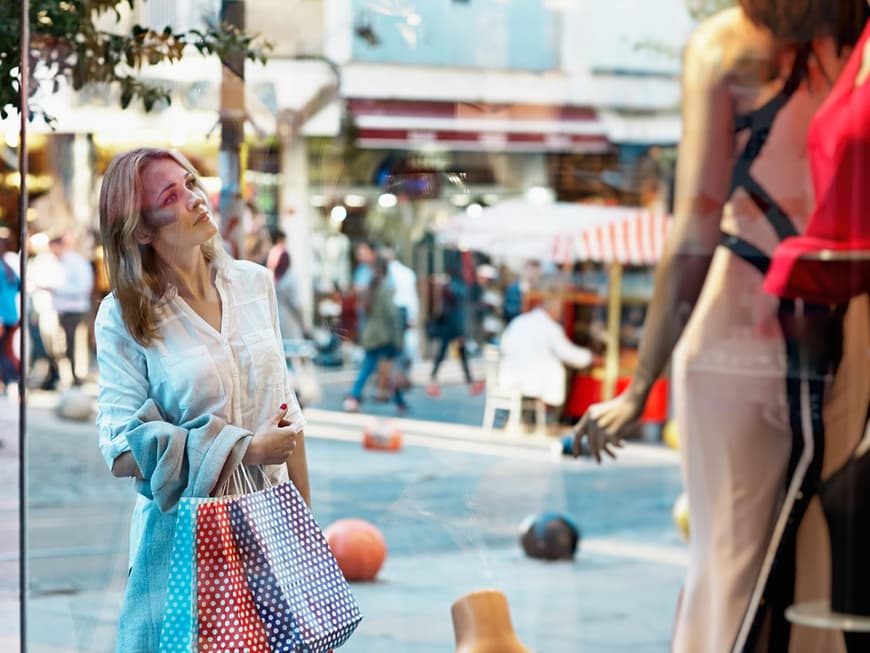
It was only a few days ago that I was once again standing in front of my favorite boutique in the neighboring town. A swimsuit. Perfect. I had the feeling of being magnetically drawn to it. As if my legs had a life of their own. Luckily, I remembered an exercise from my therapist. Breathe in and out deeply. Think about it: Do I really need this? And I said out loud to my reflection: 'Unfortunately, no vacation in sight. I managed to keep going. One to zero for me.
It all started in my childhood
I'm addicted to shopping and in withdrawal from a life that I no longer want and that I can no longer afford anyway. It was a gradual process that brought me to this point. Basically, it all started in my childhood. My parents didn't have time for me or didn't want me - I don't know exactly. But what I always got from them was the latest brand-name clothes. Back then, as a teenager, I thought that was great. Today I know that it was probably more an attempt to compensate for the lack of attention.
Then I met Dirk and was pregnant within six months. We got married quickly and moved in together. Only then did I really find out who he was: a phoney. Appearances mattered more to him than anything else. At least he could afford the lifestyle. He earned well and we lived in my parents' condominium. I often had the feeling that he didn't even notice me and our little Franzi. I bought mountains of clothes for the little girl. She looked so cute in them and sometimes Dirk noticed that too. I always bought something for myself as well. I wanted to do something good for myself, treat myself. And the sales clerks were much more attentive than my husband.
I got confirmation in my favorite boutique
Dirk left me for a younger girl. Our daughter was twelve at the time and already in the middle of puberty. Of course she got the latest clothes. And me? I was in a real slump and wanted to distract myself somehow. In my favorite boutique, I was praised every time for my good figure and great taste. It was an absolute high. It was a real affirmation for me. But unfortunately it never lasted very long.
So I set off again. Blouses, skirts and pants piled up in my closet, most of them still with labels. The heady feeling only lasted until I paid for them. After that, I was no longer interested in the clothes. Instead, the hangover was inevitable.
Then my EC card was blocked
In the meantime, the bank regularly contacted me: my account was hopelessly overdrawn. I only had a part-time job in a bookshop and Dirk kept cutting my maintenance. But the less money I had, the more I went shopping. I watched myself do it, but felt completely powerless to stop. Then my debit card was blocked. Going to the bank became unavoidable. I felt totally miserable. But in the end, it was my salvation. For the very first time - and to a bank advisor at that - I talked about my addiction. He listened carefully and made me an appointment with a debt counselor.
I am now in therapy, have a strict spending plan and contact with a self-help group. I'm doing well, despite all the hurdles I still have to overcome. Which really moved me to tears: My daughter has been through it all with me. She said the other day: "Mom, we can do this."
Tips and information on the topic
Shopping addiction has become increasingly prevalent in recent years. Where does it come from, how can you recognize it, what can you do? We asked Dr. Rolf Merkle, psychologist and psychotherapist and author of many self-confidence guides, about this.
How can a shopping addiction develop in the first place?
"There are very different causes behind shopping addiction: Anxiety, depression, inner emptiness, low self-esteem. The roots of addictive behavior lie in childhood: it is often a lack of attention and recognition, of love and security. Those affected had to earn their parents' attention and were not allowed to express their feelings freely. They experienced that they were not important as a person. They were given toys as compensation, so to speak. As adults, they didn't learn to create a healthy sense of self-worth for themselves."
When does buying become an addiction?
"Addiction criteria are: Loss of control, compulsion to repeat, increase in dose, withdrawal symptoms such as sweating, trembling, inner restlessness, depression. In the beginning, the addict believes that material things provide recognition. Later, only the buying itself triggers brief moments of happiness - the feeling of being important. This is followed by a plunge into deep depression. The addict isolates himself."
How do you get out of a shopping addiction?
"It takes many steps. First of all, you have to admit to the addiction. The compulsion to buy often disappears once the causes have been eliminated, such as frustrating working conditions, difficult relationships or conflicts with parents. The key question here is: What do I really need? What am I missing? Attention, self-confidence, a meaningful task? It's easier with therapeutic support."
What is the best way to avoid a relapse?
"Ideally, people at risk should get rid of their credit card, go to the supermarket with a shopping list, avoid spontaneous purchases, reduce their overdraft facility or only shop with someone else from now on."
Book tip: What is behind a shopping addiction and how can you find your way out? Therapists Dr. Doris Wolf and Dr. Rolf Merkle write about this in "Gefühle verstehen. Overcoming problems" (14.80 euros, PAL-Verlag).






